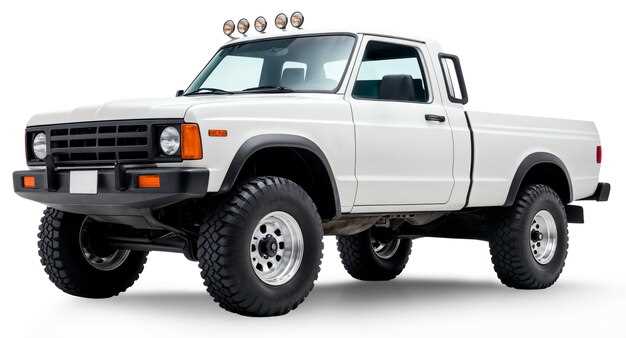
The midsize truck segment has gained significant traction among consumers seeking a balance between capability and maneuverability. Two of the leading contenders in this category are the Toyota Tacoma and the Nissan Frontier. Both vehicles boast a range of features that cater to diverse needs, from off-road enthusiasts to everyday commuters. However, understanding the key differences and similarities between these two trucks can help potential buyers make an informed decision.
First introduced over two decades ago, the Toyota Tacoma has established a reputation for its reliability and robust off-road performance. With advanced engineering and a suite of safety features, the Tacoma is not just a workhorse but also a vehicle that inspires confidence in any driving environment. On the other hand, the Nissan Frontier has undergone significant updates to remain competitive. Known for its strong V6 engine and comfortable interior, the Frontier has become a commendable option for those who prioritize comfort without sacrificing capability.
In this article, we will delve deeper into various aspects of both trucks, including their performance specifications, interior features, safety ratings, and overall value. By comparing the Toyota Tacoma and Nissan Frontier side by side, potential buyers will gain a clearer understanding of which vehicle aligns best with their needs and lifestyle.
Performance and Engine Options: Which Truck Delivers More Power?
The Toyota Tacoma and Nissan Frontier are two contenders in the midsize truck segment, each offering a range of performance and engine options designed to meet diverse driving needs. When evaluating power delivery, it is essential to consider the specifications and capabilities of both vehicles.
The Toyota Tacoma typically comes with a choice of two engines. The base engine is a 2.7-liter four-cylinder that produces around 159 horsepower and 180 lb-ft of torque, suitable for everyday driving and light towing. However, for those seeking more vigor, the Tacoma offers a robust 3.5-liter V6 engine that generates approximately 278 horsepower and 265 lb-ft of torque. This V6 option provides a significant boost in performance, especially when it comes to towing capacity, which can reach up to 6,800 pounds when properly equipped.
In comparison, the Nissan Frontier has made strides in its powertrain offerings with the latest generation. The primary engine choice is a 3.8-liter V6 that delivers 310 horsepower and 281 lb-ft of torque, surpassing the Tacoma’s V6. This engine is paired with a nine-speed automatic transmission, enhancing performance and fuel efficiency. The Frontier’s towing capacity is also competitive, reaching up to 6,720 pounds, which positions it well for consumers needing towing capabilities.
Both trucks provide options for rear-wheel and four-wheel drive, giving drivers versatility for various terrains and conditions. The Tacoma’s off-road variants, like the TRD Pro, are enhanced for trail performance, featuring upgraded suspension systems, skid plates, and all-terrain tires. The Frontier also offers an off-road trim known as the PRO-4X, equipped with similar features aimed at rugged performance.
Overall, while the Toyota Tacoma has proven reliability and a well-rounded powertrain, the Nissan Frontier stands out with its higher horsepower and torque figures. Drivers prioritizing sheer power may prefer the Frontier, while those favoring a balanced, time-tested option may lean towards the Tacoma. Ultimately, the choice depends on specific performance needs and preferences.
Interior Comfort and Technology Features: A Side-by-Side Evaluation

The interiors of the Toyota Tacoma and Nissan Frontier offer distinct experiences, each catering to different preferences regarding comfort and technology. Both trucks have made significant advancements in their latest models, providing a blend of functionality and modern features.
Seating and Space: The Toyota Tacoma boasts a spacious cabin with well-supported front seats and an optional power-adjustable feature. The rear seats, however, may feel cramped for taller passengers, particularly in the access cab model. In comparison, the Nissan Frontier offers a more accommodating rear seating area, making it a better choice for those who regularly transport multiple passengers. The Frontier’s seats are designed for longer journeys, providing ample cushioning and support.
Materials and Build Quality: Tacoma’s interior materials vary between trims, with higher trims featuring more premium materials, including leather upholstery. However, some lower trims use hard plastics that may detract from the upscale feel. The Frontier focuses on durability with rugged materials but also incorporates softer surfaces in higher trims, making it practical yet inviting.
Technology Features: The Tacoma is equipped with a user-friendly infotainment system that incorporates a touchscreen interface, Apple CarPlay, and Android Auto, keeping connectivity at the forefront. The truck also offers advanced safety features like adaptive cruise control and lane departure warning as standard on many trims. Conversely, the Frontier has introduced a new infotainment system with a larger touchscreen display in recent models, providing enhanced graphics and usability. While it supports Apple CarPlay and Android Auto, its safety tech features have been steadily integrated, ensuring drivers feel secure on the road.
Storage Solutions: Both trucks excel in providing practical storage options. The Tacoma features multiple cupholders and additional cubby spaces, while also offering under-seat storage in the rear. The Frontier complements this with a similar layout, introducing more accessible storage compartments that enhance usability. The bed of each truck also offers various tie-down points and available bed accessories that cater to different hauling needs.
In conclusion, the Toyota Tacoma and Nissan Frontier both present strong interior comfort and technology offerings but cater to slightly different target audiences. The Tacoma leans towards stylish functionality with a focus on tech integration, while the Frontier emphasizes space and passenger comfort, making it an all-around practical option for families and adventure seekers alike.
Pricing and Reliability: Which Truck Offers Better Long-Term Value?

When evaluating the long-term value of the Toyota Tacoma and Nissan Frontier, two critical factors come into play: pricing and reliability. Both trucks cater to a similar demographic, but their price points and reliance on durability can significantly influence a buyer’s decision.
The Toyota Tacoma generally carries a higher starting price compared to the Nissan Frontier. This difference can be attributed to the Tacoma’s robust reputation for resale value and its extensive list of standard features. Buyers often find that the Tacoma’s initial investment pays off as it tends to hold its value better over time. According to recent studies, the Tacoma ranks high in resale value, often outperforming competitors in the midsize truck segment.
On the other hand, the Nissan Frontier is typically priced lower, making it a more budget-friendly option for consumers. While it may not hold its value as impressively as the Tacoma, the Frontier has received positive feedback for offering considerable truck capability at a more accessible price. For budget-conscious buyers, the upfront savings could be more appealing, especially if they plan to keep the truck for several years.
When it comes to reliability, the Tacoma has earned a stellar reputation for durability and longevity, often surpassing 200,000 miles with proper maintenance. Toyota’s commitment to quality engineering has made Tacoma a favorite among owners seeking dependable performance over the years. Many Tacoma owners report minimal issues, reinforcing its image as a reliable choice.
The Nissan Frontier, while also reliable, has experienced some fluctuations in reliability ratings over its various iterations. Recent models have seen improvements, but historically, they have not matched the long-term reliability metrics of the Tacoma. Consumers often note that while Frontiers are generally dependable, they can sometimes face issues after extensive use, leading to higher average repair costs over the lifespan of the vehicle.
In summary, for those prioritizing long-term value, the Toyota Tacoma may present a stronger case due to its higher resale value and established reliability. However, the Nissan Frontier offers an attractive price point and decent reliability, making it a suitable choice for consumers looking for more immediate financial savings. Ultimately, the decision between these two trucks will hinge on whether buyers value upfront cost or long-term investment potential more highly.




